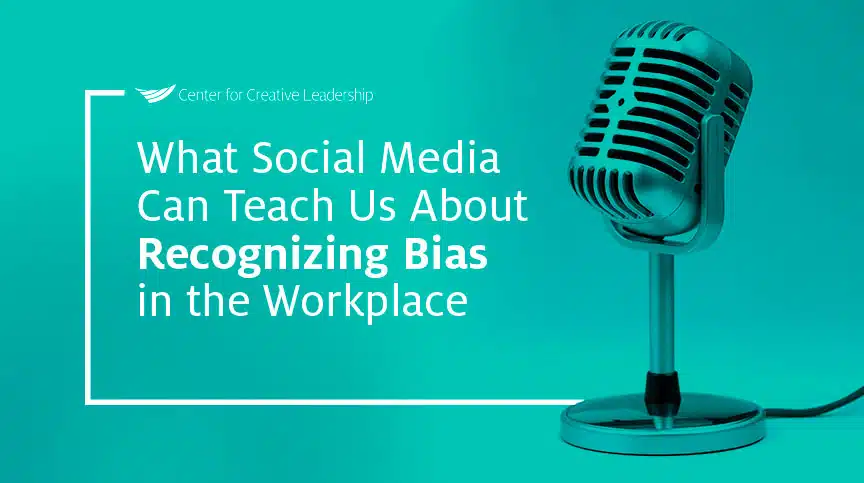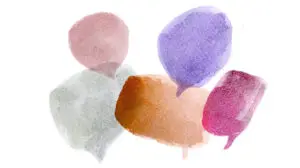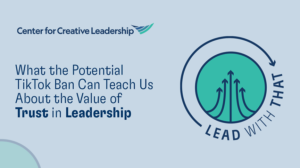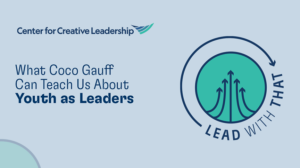- PODCAST
Lead With That: What Social Media Can Teach Us About Recognizing Bias in the Workplace

In this episode of Lead With That, Ren and Allison explore what we can learn about recognizing unconscious bias in the workplace from the way news stories are covered on both social media and mainstream media.
By now, you likely know the name of Gabby Petito. Both mainstream media and amateurs on social media have committed hour upon hour to try and find Gabby and raise awareness of her case. The case captured the nation’s attention as more details of her disappearance played out on primetime news.
Much like the mystery surrounding Gabby’s disappearance, there are a lot of factors that play in this story. But for many, this story only highlights what’s not covered so compulsively by the media: The disappearance and death of thousands upon thousands of women of color. Today, we want to explore what can be learned from the media coverage of Gabby Petito. We’ll look at what parallels exist between this story and our work lives. And we’ll talk about what leadership can take away from some of these big and tough reflections.
Listen now or read the full transcript below.
Listen to the Podcast
In this episode, Ren and Allison explore what we can learn about recognizing unconscious bias in the workplace from the way news stories are covered on both social media and mainstream media.
Interview Transcript
INTRO:
Welcome back to CCL’s podcast Lead With That. We talk current events and pop culture, we look at where leadership is happening, and what’s happening with leadership.
Ren Washington:
By now, you likely know the name of Gabby Petito. Both mainstream media and amateurs on social media have committed hour upon hour to try and find Gabby and raise awareness of her case. Tragically, her body has been found. And a lot of people are saying it’s due to foul play by her boyfriend, who police are still looking for. And Petito’s case captured the nation’s attention as more details of her disappearance played out on primetime news.
Much like the mystery surrounding Gabby’s disappearance, there are a lot of factors that play in this story. One of the biggest factors is the role the internet played in finding Gabby’s body and stitching together the pieces of this strange puzzle. But for many, this story only highlights what’s not covered so compulsively by the media. The disappearance and death of thousands upon thousands of women of color. Today, we want to explore what can be learned from the media coverage of Gabby Petito. We’ll look at what parallels exist between this story and our work lives. And we’ll talk about what leadership can take away from some of these big and tough reflections. I’m Ren Washington, one of the partners here at the center, and as usual, I’m joined with another partner here at CCL, Allison Barr. Hi, Allison.
Allison Barr:
Hi, Ren.
Ren Washington:
Hi.
Allison Barr:
Thanks for being here today.
Ren Washington:
Yeah, it’s good to see you.
Allison Barr:
Before we get started, I do want to issue a strong content warning for our listeners. We will reference topics of violence, domestic violence, racism, and homicide. And I do know that for some, these topics can elicit quite a strong response, for probably more people than we’re aware. It can be close to home. And we’d like to offer you a moment to opt out if these topics will be a little too close to home and difficult to hear.
Ren Washington:
Thanks Allison. I think in our last conversation, we talked about the responsibility we have to look around us and maybe have tough conversations. And I think this is one of those tough conversations. And we’re not here to trivialize anything that happened to Gabby. It truly is a tragedy. When I think about the women in my life, my wife, my stepdaughter, when I think about the experience that Gabby must have had to go through, it saddens me, it hurts my heart. And I know that this is an example of so many things that pain us in this country and in this work that we do, and there’s a lot to dig into. And so, Allison, I’m wondering, when was the first time you heard about Gabby?
Allison Barr:
I saw a story… Let me back up. I like TikTok, I’ll admit that. I surf TikTok quite frequently. And I follow a lawyer and she will come on daily and say, “It’s Monday night, here’s what happened.” And she’ll just give brief headlines of the news without her opinion or anything like that. And I listened to one of her TikToks and this must have been in early September. The last thing that she said was, “I’m not even going to get into Gabby Petito right now, there’s too much to say.” And she baited me. Right?
Ren Washington:
Mm-hmm (affirmative).
Allison Barr:
I was baited. And I thought, “Who’s Gabby Petito?” And then I realized that I followed her on TikTok, which led me down a rabbit hole, of course. And I admitted to you before, and I’ll say it again, I became really entrenched and I checked daily about that story to find out what was going on.
Ren Washington:
Do you know when you started following Gabby?
Allison Barr:
It was a long time ago.
Ren Washington:
Really?
Allison Barr:
Yeah. When you join TikTok, it asks you what kind of content you want to look at. And one of the things I chose was nature. And so one of her videos, it might have been in February where she was sitting in her van, in this beautiful landscape, eating a sandwich. That’s all I remember. That was one of her first videos. And so I follow a lot of people on there and I had forgotten that I’d followed her.
Ren Washington:
Wow.
Allison Barr:
What about you?
Ren Washington:
Well, do I follow her on TikTok?
Allison Barr:
When did you hear about it?
Ren Washington:
I heard about Gabby when Kyle and Jen Bethune, the YouTubers who realized, as they were hearing about Gabby, that they were recording footage for their YouTube channel in the same area that police were looking for Gabby. And so they went back into their files and they realized that they saw the van that the two were driving in, Gabby and her boyfriend, where they eventually too found her body, Gabby’s body. So that was the first time I’d heard it. And I was just scrolling through news. And I think I’d heard about her name, but I didn’t pay attention until I’d opened that app. And then the algorithm started responding to me.
And so it started to check, show me more and more stories, which I think led me to where I wanted to talk about today, around this experience that, I don’t know if it’s unique to America, but it certainly is American, where young, white women go missing and it energizes and galvanizes communities all over the internet. So that’s where my rabbit hole began. But tell me a little bit more around yours. So you were following her, you heard about the lawyer, you went to see about Gabby. You realized you were following her. What was your real-time experience of the mystery as it was experienced in the nation?
Allison Barr:
Gosh. Similar to yours. I think I got hooked because it’s unfortunately, a familiar story, and that’s unfortunate. And you mentioned earlier, indeed, there is a major discrepancy that exists when white women go missing. I mean, there’s movies made about white women that go missing. It’s all over the media. It’s everywhere. As opposed to native women, black women, trans women. Trans women go missing at alarming rates, and we don’t necessarily hear about that unless we search for it. So I don’t know. That was intriguing to me, so I went down that rabbit hole as well. And I think because it’s a familiar story, I felt a little bit of fear, I guess, is the right feeling.
Because the only suspect, right, is still at large. And again, it’s just an all too familiar story. And so I wanted closure probably. I don’t deserve it, right, because I’m not her family. However, I went down both of those rabbit holes, right. I saw in my algorithm then stories of black women and black men and native people, trans women, starting to pop up because the algorithm, like you just said, caught on to me. Right. And I did see some of the power that social media can have. And the conversations from some people on TikTok and Instagram were, “Why are we spending so much focus on Gabby? Can we add some focus to these folks as well?”
And it’s not to take away from what Gabby and her family are going through. I think we can talk about this and also offer condolences to their family and look at the much bigger picture. Right. Which is what you’re alluding to.
Ren Washington:
Yeah. You said the word fear earlier. Can you tell us a little bit more around that?
Allison Barr: Sure. My feeling do you mean?
Ren Washington:
Yeah. Yeah.
Allison Barr:
Sure. Yes. So, gosh, where do I start? First, I want to say that there are nuances and there are parallels that we make in the workplace. And while I don’t want to make a direct comparison, there are a few important details that highlight a much bigger obstacle where my fear probably came from. And so here’s where I kept getting stuck. And I think I might have told you this when we were brainstorming about what we were going to talk about. Here’s where my brain keeps going. So there was a bystander in Moab who called 9-1-1-
Ren Washington:
Right.
Allison Barr:
… and reports that they see a man slapping and hitting a woman. The police respond to this. Right. They find the couple that would be Gabby and Brian. The police officer separates the couple and speaks to them individually. And that’s common. That’s protocol. Gabby is clearly distraught. I think she’s crying. She’s shaking. This was all in his body cam. Anyone can go and watch this. She’s almost hyperventilating at times. And Gabby says to the police officer, “You know, this isn’t my fault. He wouldn’t let me in the car. I was distracting him. I don’t want him to get in trouble. It’s my fault. I was working too much and we kept fighting.”
And then Brian, on the other hand is calm. He immediately and quickly blames Gabby. And then he is seen on video joking around with the officer while Gabby is still isolated and sobbing. And Brian has some scratches on him. It’s put into the official report that Gabby has had a mental breakdown, while the police report states that the 9-1-1 call did not have any indication of a man striking a woman. You can listen to that 9-1-1 call and it’s exactly what is stated, but the report says the 9-1-1 call did not have any indication of a man striking a woman. So I can’t get my brain out of that, and it’s common for women. This is common.
It’s common that women aren’t believed or that they’re not taken seriously. And that’s why it made me feel fearful because it’s too common. You know somebody who this has happened to, we all do, whether you know it or not. And so that’s why it made my heart skip several beats.
Ren Washington:
Yeah. Thanks Allison. And it is, it’s all too common, and it’s so horrible that things like these continue to happen, and then just all of the surround around Gabby’s experience. For those who don’t know, Gabby Petito and her boyfriend decided to drive across country in their van to experience the national parks and state parks of the United States. And Gabby was reaching out to her parents consistently, multiple times. And then at the end of August, that communication just stopped abruptly when they were heading to Yosemite. About six days later, Gabby’s boyfriend, Brian, arrives home in Florida.
So away from Wyoming, without Gabby. And then a few days after that, they, or rather, I think he may have arrived home in the beginning of September, in Florida. A few days after that, he and his family go on a camping trip to one of the areas out in the wild. A few days after that, Gabby’s parents call the New York Police Department and identify her as missing. And now we’re all the way where we are now, where there’s just been some manhunt for Brian in these Everglades, this Florida area, and Gabby’s body most recently found in Wyoming. And when I see that, and I hear your fear, I think like I said up top, I am reminded of the things that my wife and my stepdaughter have to be conscientious of and take care of that, maybe I don’t.
And I too had some fear here, and not just rooted in my family, but also fear that there are a lot of parts of this story that are all too common. One of them being that this kind of outrage or conversation rarely happens for women of color. Have you ever seen that movie Three Billboards … You know what I’m talking about? It was-
Allison Barr:
No.
Ren Washington:
Okay. Well, it was called Three Billboards and they shortened that, but it was the longer title. Frances McDormand is the lead and her daughter goes missing. And this was a very popular movie. And it talks about, I think the plight, like we’re experiencing here. But part of the parallel conversation that happened when that movie came out was that this is another example of this kind story getting glorified. And I don’t know if I feel good about saying glorified, it’s a horrible story. But this kind of story being highlighted, about a “good looking” and good looking in air quotes here, which is, a petite, blonde haired, blue-eyed woman, goes missing in America.
And America gets on its sleuth hat and makes it happen. I mean, in 2020, something like 200,000+ people of color were reported missing. That number makes up nearly 40% of all reported missing persons in 2020. And I know it’s 2021, but I think I can can name Gabby, but I can’t name any women of color who’ve gone missing. I mean, just alone in the state of Wyoming, something like 710 indigenous people, predominantly girls have been gone missing. And so the all too familiar tale here for me is, this yo-yo that we do, where the conversation comes up, a tragedy has occurred, the internet has galvanized. We are trying to help a young woman, which yes we should.
And then we recognize, “Well, how many young, 22-year-old dark skinned women with brown hair and brown eyes have been missing and none of them have TikTok hashtags?” Geez, you can tell that I’m really active on the interwebs.
Allison Barr:
The TikToks. Yes. The TikToks.
Ren Washington:
The TikToks.
Allison Barr:
Well, I think what you’re highlighting and what is being highlighted is bias, perhaps a lack of racial empathy, structural racism. And I would say apathy. Stories of women being abducted and girls as well, this isn’t new to your point. It’s not new. This is not new for women. I mean, domestic violence is the leading cause of death for women, not disease, domestic violence. And I just wonder when we’re going to start looking deeper at the source and the root cause. Right. These numbers that you just shared are staggering. I saw those as well after we talked last week, I Googled it and it makes my heart sink. It’s very important to talk about.
And when are we going to start looking at the source and the root cause of people going missing? Right. It’s mind-boggling to me. And I think one of the organizational lessons here is in improving upon how we respond to women who are very frequently put into harmful situations. These situations on a very different scale happen at the workplace every single day. Every single day. I had a client recently share with me that she reported to a supervisor that she was feeling unsafe with a certain peer, and she was told that she was too sensitive, later told that she was being dramatic. And again, this kind of thing happens every day for women at work, and more so, to black women, indigenous women, women of color, and also white women.
And so again, they happen on smaller scales, but there’s still a major impact. And I’m just curious from you, Ren, when’s the last time you were told to cover up your collar bones at the workplace because people were worried men would get the wrong idea?
Ren Washington:
That’s never happened, admittedly.
Allison Barr:
And then if you followed suit, when were you told that you look too matronly and that you need to dress differently? And when’s the last time you asked for equal pay and were told that you were too aggressive or difficult to work with? Inequities for the women at the workplace are not new, just like they’re not new outside of work. And we know this. And instead of talking about the root cause, women’s behaviors then get interpreted to confirm biases and beliefs. Gabby had a mental breakdown, is what was put in that police report. No, she was abused. She was abused.
Ren Washington:
Yeah.
Allison Barr:
So what do you think about that?
Ren Washington:
I think that, we’ve got two soap boxes next to one another, and I don’t want to marginalize our point of view. But there’s things that we really care about. And I think as I reflect on your experience, talking about what women have to go through in the workplace, I’m reminded of, and then yes, the people of color and the women of color. You can imagine, if white woman… I’d imagine this client was a white woman. Was she a white woman? I don’t know. You tell me.
Allison Barr:
Which one? The first one?
Ren Washington:
The one who said that they were having a peer that they were feeling uncomfortable with?
Allison Barr:
That was a black woman.
Ren Washington:
A black woman. Okay. So I stand corrected.
Allison Barr:
Mm-hmm (affirmative).
Ren Washington:
I guess, the moral of my story is, we’re trying to draw parallels here, is that you can imagine that if a woman is told to get over it, that that same narrative or those same kind of varied or weird hypocrisies or double standards exists for people of color as well. And so I think there’s a couple of things happening here, which is, a woman’s experience in the workplace, that mirrors this as all too familiar. And what I additionally would say, another thing that’s mirrored here in the workplace is, under recognized groups, marginalized groups, not getting any attention for their pain or their plight.
And then we look at these other instances as these lightning rods of an issue, where we say, “Well, look, this shouldn’t happen anymore.” And then people are looking around and saying, “But this has been happening to us for years. Why now the concern?” And so I think, I absolutely agree that way, it’s hard when we start to explore how… We’re talking about two marginalized groups right now, and we’re talking about women.
Allison Barr:
We’re talking about women. We’re talking about women.
Ren Washington:
Yeah. We’re talking about women and, yeah. Right, women. And then what we’re talking about, you and I, now is intersectionality. That women and a woman of color on all of those continuums of dominant to subordinate… Typically, women are subordinated to men in our patriarchal culture. People of color are subordinated to white people or not people of color. We see that same kind of subordination between how our hetero-relationships seem to be prioritized over our homosexual relationships in our society. And so when we look at all of that complexity, we see, yes, a woman who’s being marginalized already by the fact that she’s woman, she has to deal with these things.
And then my other lens is, then I can only imagine how that marginalization is amplified when people experience other identities that are subordinated. And I think we’re seeing this very thing in all of these groups who highlight the fact that this thing happens in communities all over the place. I don’t want to hijack too much more, but there is this website that I found, and it is called Our Black Girls. Tens of thousands of black women vanish every year. And this website tells their story. And it’s things like this that you would never hear about if not for Gabby. And so I think we align on some of our thinking around how this is a horrible experience and should not have happened.
And then two, it makes me think about all the horrible experiences that are happening, where people aren’t having a chance to talk about them, aren’t getting the visibility, and people are still missing.
Allison Barr:
Yeah, absolutely. And I want to give credit where credit is due and offer our resource to listeners as well, which is the work of Kimberlé Crenshaw, who coined the term intersectionality. It’s fascinating. It’s eye-opening. And I would encourage people to give her a Google. She’s got a TED talk and a lot of research. Anyway, I digress on that, but a good resource. And I think, yes, there is a huge disparity that women of color experience, and this is more often and more severely than what white women experience. And again, I want to go to the source. I want to talk about why this is happening. That’s complex. I realized that.
However, what I want to share with you is that, in a recent program that I did with a peer, we shared the top 10 obstacles that women, including trans women, including black women, including indigenous women, all women of color, including white women as well, the top 10 obstacles that women face at the workplace. I already mentioned some of them, right. It’s like being coined dramatic. She’s playing the race card when she sticks up for herself. Look at how she was dressed. She’s aggressive for advocating for herself. Inappropriate sexual conduct, inappropriate sexual jokes, retaliation, general exclusion. These are things that women face on a daily basis. And yes, black trans women experience this at, statistically speaking, at higher rates than any woman.
And so where do we start with that? Right. And if we look at EDI programs, for example, we have to consider that this starts at a very personal and very deep level. I think people are very well-intended. I think companies are well-intended and are looking at EDI programs to support. However, the stuff is deep. This stuff runs really, really deep and individuals have to know what their beliefs are about women, women of color, trans women, and challenge those beliefs. This has been around forever, throughout the 18th and the 19th century. And through now, the most commonly diagnosed disorder for women, do you want to guess what it was? Most commonly diagnosed disorder?
Ren Washington:
Oh, gosh. I’m just trying to think about what a group of men would think was wrong with women. I don’t know. I’m sure it’s going to be ridiculous. Then you get noticed.
Allison Barr:
Well, thankfully, it’s no longer considered a diagnosis, but it has evolved. Right. So the most commonly diagnosed disorder was female hysteria. And the criteria was when their stomachs bloat, when they’re tired, when they cry, it’s a disorder. Right. And thankfully, it’s not recognized as a disorder anymore, but I’m not so sure that that deep-seated belief about women has changed much. Right. We talked about this in our last episode, a little bit, beliefs drive our behavior. And so what is it that the majority of people believe to be true about trans women, for example? And what do we need to challenge about that? Because you can have the best EDI program in the world, but if you believe something that is going to bump up against that EDI program, about trans women, guess what? Nothing’s going to change.
Ren Washington:
Yeah. Allison, I think my answer to your question is, where this stuff happens? Why nothing changes? Let’s look at the root cause. Is fragility. I was talking to the kids at dinner, and a picture of SeaWorld came up, because they went to SeaWorld some years ago with their grandparents. And I think we were just talking about documentaries too. And so there was a picture of one of those big orcas with their faulted-over fin. And my stepdaughter Lavie, she’s like, “Oh, that’s too bad.” And it got me thinking about Blackfish, that documentary around SeaWorld. Right. Have you seen that thing?
Allison Barr:
I cannot watch that horror film. No.
Ren Washington:
Yeah. And so I mentioned it and I was like, “Okay, kids, I don’t know if that’s really friendly. And I don’t know if we want to see that.” And then my stepson proceed to say, “Well, I don’t want to see that.” Well, and I said, “Why?” He said, “I don’t want that to ruin my good memory.”
Allison Barr:
Mm-hmm (affirmative).
Ren Washington:
And God bless children.
Allison Barr:
I know.
Ren Washington:
They help synthesize so many things for me. And in that moment I realized the kind of agility that we’re faced, that men engage in when they can’t admit or recognize the plight of women or that people engage in when they don’t recognize or understand the plight of people of color. Is this moment of like, I don’t want to ruin a bad memory. I don’t want to be thinking about how I contributed to that reality.
Allison Barr:
Mm-hmm (affirmative).
Ren Washington:
Or how, “Yeah, it’s tough, but right, Allison, I’m one of the good ones. Right. So we don’t need to talk about your experience.” And so I think the root of all of those things is an unwillingness to look at the darker corners of the mirror.
Allison Barr:
Yeah.
Ren Washington:
And in moments like Gabby, to righteously pat ourselves on the back and to say, “Well, look, I did my due diligence. I hashtag Gabby Petito. I engaged in the Reddit solution and the TikTok sleuth thing. And so I’m doing my part.” And then in this moment we say, “Yeah. And I recognize too that other people are hurting.” And then I assume the conversation ends because maybe we don’t want to ask ourselves, “What are we doing to contribute to people hurting?”
Allison Barr:
Mm-hmm (affirmative).
Ren Washington:
I mean, I know that because of me being a man in America, I have certain benefits and I have no doubt. Unintentionally, I’ve probably embodied some of that patriarchy too. That served as a disadvantage to you.
Allison Barr:
You definitely have, and so have I.
Ren Washington:
Okay. Yeah.
Allison Barr:
And I just want to make the point. Right. First of all, I’m laughing a little because when you asked me if I saw that movie, Blackfish, I said, “No, I don’t want to watch that horror film.” But you’re right. It is about facing the responsibility that we have and admitting it. And it’s hard. It’s hard to do. It’s hard to do and it doesn’t feel good. And I think what’s an easier way out is calling things systemic, because then when we call it systemic, you don’t have to speak from I, you don’t have to. But who upholds systems? Who created systems? Humans, human beings did.
Ren Washington:
Mm-hmm (affirmative).
Allison Barr:
And so I uphold it. Right. I’m a white woman. I have certain privileges in certain circles, just like you do as a man. Right. So it’s about identifying what we are doing individually to support other people.
Ren Washington:
It reminds me of a phenomena. I studied political science in my undergrad, and I’ve always been a US history buff. And I think US politics is weird and scary and awesome. And there’s a phenomenon in American politics where statistically, regularly, Americans hate Congress, everyone on all parts of the aisle, they all think, “How is Congress doing?” When we even are asked ratings, “How’s Congress doing?” They rate them low. And they say, “How’s your congressperson doing?” And we rate our congressperson, thumbs up.
Allison Barr:
Yep.
Ren Washington:
And it’s that recognition, like, “Oh, well, no, Congress sucks, but my person’s great.” And if everyone says my person’s great, then aren’t they contributing to the environment for which we are pointing at and saying that it sucks? And I think that phenomenon there is, yeah, when we’re around us, it’s like that joke of, who wants change? And everyone raises their hand. Who wants to change? And no one raises their hand.
Allison Barr:
Right.
Ren Washington:
And I think it is that thing, “Well, I want to look at this, but I don’t want to look too hard because if I do look too hard, maybe I’ll identify ways that I’ve contributed to an environment that maybe doesn’t support the people that are being marginalized.”
Allison Barr:
Yeah. And it’s deeper too, because, well, I guess it goes in tandem with your example about Congress, which is all too real. And there is a part about listening to understanding too, listen from a place of understanding. And I was talking to my partner, Roger, about this, and he was like, “It’s about believing. We have to believe women.” And part of me is like, “I don’t really know if I care if you believe me. I do, because my experience is my experience, and I hope you believe me.” But it’s more than that. It’s listening from a place of understanding.
We talk about that a lot at CCL as well, how to have better conversations. And that certainly can come into play when we’re talking about these types of things. Just because I tell you about an experience that I’ve had, that was maybe violent or inappropriate at the workplace, doesn’t mean that I’m saying it was you.
Ren Washington:
Right.
Allison Barr:
So it’s about not centering myself when I hear stories of black women or indigenous women. I’m not going to center myself because that’s not what we’re here for and that’s not going to help.
Ren Washington:
Right. Yeah, I have it bad too. Maybe that’s not the point of the convo. And too, I think, the centering, I mean, exactly, I think that’s what men do all the time. What the source is, the attention around the women’s experience in the workplace, like you were saying. I think men do that all the time where you might come up to them and say, “This is the experience you’re having in the environment. And because of this, the way that men and women are treated differently.” And then I might look at you and internalize that, I’d be like, “No, no, no, no, no, I’m not doing that.” So it’s invalidated or it couldn’t be true. Or maybe I am doing some of that stuff, and I just… It’s too hard to investigate. And so for me, that’s what this story highlights.
Allison Barr:
Mm-hmm (affirmative).
Ren Washington:
And then I think the reason that we’re talking about it, I think, like we talked in our LinkedIn Live. Stories of equity matter to me. My children are Cherokee. I am black. My people are represented in the stories that are not told. And when I see things like this, I’m pained and so hurt that a family lost their young daughter. And bunch of circumstances, that maybe there were so many ways along the path where it could have been stopped. And my big takeaway here is that she matters, and so do the other thousands of people missing.
They matter. Maybe my chance, as a leader, when I’m having these tough conversations about race and around people’s lived experiences, maybe I need to investigate my own outrage and see where, if I’m really frustrated about how someone’s being treated or aggravated, maybe I look about where I’m really aggravated and then where that aggravation could be used somewhere else. Or maybe there’s someone else who needs me to champion them as well. And so I think, as a leader, I smiled, Allison. I mean, I don’t know if I need to believe you as my employee, because frankly, as a woman, I would vibe like, “I don’t know if I need you to believe me that this happened to me because it did. Your belief doesn’t matter, but maybe you can listen with an understanding and open heart and mind.”
And maybe too, as a leader, I can listen to people with an open heart and mind and then maybe try to identify places where my energy of support, my wanting to be a better person, better leader. I can find other places to do the at as opposed to the Gabby Petito that comes up and serves as my effort, but a mainstream one.
Allison Barr:
Mm-hmm (affirmative). Yeah. And I think there’s part of what you’re saying that I want to add to, which is complex. So I’ll acknowledge that right off the bat, but it’s also speaking up. Right. So imagine you’re at the workplace and somebody says to a peer of yours who is a woman, right, a black woman, something offensive. Hold your people accountable. Right. You don’t necessarily have to do it in that moment, but I might pull Susan aside and be like, “Hey, this is how I experienced this.” I’m not going to speak for somebody else. Right. This is about feedback. Right. So we don’t give feedback on behalf of other people, it’s the same thing.
I’ll speak for myself. “How I experienced what you just said about so and so, it made me uncomfortable. What did you mean?” It’s having those brave conversations and advocating for people when they’re not in the space as well. And we always talk about… At CCL, is what I mean by we. We talk about self-awareness being one of the most important factors of being a good leader. And this drew me to the ladder of inference. Do you know that tool that we have?
Ren Washington:
Mm-hmm (affirmative). Yeah. Yeah. Tell us about it.
Allison Barr:
Yeah. I was facilitating a program yesterday and it was part of the program. And I just couldn’t stop thinking about it. If y’all could imagine a ladder, this is essentially what happens when we operate from assumption and what happens is we observe data and then we select that data and make it important. So I’ll give us a benign example. Okay. Ren is looking at out the window. I see Ren, he’s looking out the window. I add meaning and motive to it. Ren is bored. I make assumptions. I am boring Ren. I draw conclusions. Ren must not like me or think that I don’t have anything to say. And then I act on those conclusions and that can look like anything. But the impact is that it affects our relationship then.
Ren Washington:
Mm-hmm (affirmative).
Allison Barr:
And then my beliefs solidify. And all of that happens by the way in less than a quarter of a second. Our brains are so efficient, but sometimes they work against us. Right. So it’s being able to identify what our patterns are first, that lead us to beliefs that will then become problematic. It’s the same as, Susan is showing her collarbones, what if men can’t control themselves? And then Susan is inappropriate because she’s wearing an… I’m air quoting it, “inappropriate outfit”. Okay. That happens all the time. When I tell you Ren the conversations that I have with clients on a one-on-one basis, women, mostly, and the experiences that they have at the workplace, this kind of thing needs to be under control, and we need to talk about it more.
It’s not okay. Right. Because then it’s a domino effect. And then there’s women at the workplace who are unsafe and feeling safety cues that will cause them to feel unsafe every single day. And it’s a domino effect and it starts again, it starts from that individual level, it has to.
Ren Washington:
And I’m reminded again, and you highlighted this around, we may not talk about these things or we may not bring them up or we may not say, “Hey, I recognize this behavior.” We may see something, but not say something, and it’s a domino effect. And I would say even more that there’s things that are just, we don’t even know what to look for, for the experience like this, where there’s… We don’t even see a slight against someone who’s usually slighted. And I can tell you from my point of view and the people of color that I’ve spoken to, the hardest mindset to overcome is the, “Well, that’s just the way it is.”
Allison Barr:
Ah, I’m sorry.
Ren Washington:
There’s people who just shrug their shoulders and they go, “We’ve just learned to deal with it.”
Allison Barr:
Yeah.
Ren Washington:
And so in an environment where they’ve learned to deal with it, I can only imagine people who’ve witnessed the feelings, have learned to deal with it as well. And it’s like via that moment where maybe we’re taking for granted the things that we’ve gotten used to. Or maybe because we’ve gotten used to them, we’re not recognizing how messed up they really are. And so, how do we do both? How do we uncover the reasons why something like this happens to Gabby? How do we uncover the reasons why something like this happens to women in the workforce? And then double down on that and then double-click onto it and then say, “Well, let’s investigate the reasons why we don’t talk about how this happens to other people.”
And so I think, just continuing to practice and intentionally review and go into it without worrying about centering myself or being the victim or the villain of this story, and instead, maybe I can just be a partner or a friend or a colleague who wants to help and who maybe doesn’t know how. And maybe the first step is to recognize the places where my energy, my outrage, my aggravation could be better served, could also help, not better serve necessarily, but could also help.
Allison Barr:
Yeah. I think, from people who are in positions of power, those words that you said, that’s just the way it is. That’s six words. Right. Those are dangerous words, especially if you’re in a position of power. This is just the way it is. And I just had this conversation with somebody last week, who’s in a position of power, who felt helpless, and that’s a real thing too. Right. You feel helpless. And he said to me, “Allison, this is just the way it is.” And I challenged him, “I want you to speak from I. Speak for yourself. Say that again and speak from I. ‘This is just the way I am.'” Which is very slight shift, but it’s an important change. If you are in a position of power and you’re feeling helpless, say it that way, “This is just the way I am.”
And then he corrected himself and said, “No, actually that’s not just the way I am.” Right. Exactly. And so it’s challenging. You have to be able to be brave enough to challenge everything. And you mentioned feeling aggravated and frustrated by the way things are and putting them towards something that might be helpful. Right. So that’s also something that we can do. It’s easier said than done. And I always think that patterns and themes of inequality always going to start at the individual level. So it’s like speaking from I, “Here’s what I think. Here’s what I believe.” You don’t have to even tell anyone if you don’t want to.
And then it’s listening from a place of understanding. And yes, believing them is part of that, but it’s listening from that place of understanding and not centering yourself and resisting, really resisting the temptation to prove to yourself what your biases are, because that’s a loop that happens. It’s like, so and so shared a story with me of their experience. I then took it personally, and then I just confirmed my own biases so that I don’t have to be responsible here. And we’re all responsible.
Ren Washington:
Yeah.
Allison Barr:
Yep.
Ren Washington:
Thank you. Very thoughtful. I appreciate you digging into this one. This is a tough thing to talk about. There’s a lot here. I mean, in the truest sense, I know there’s lots more that we can talk about.
Allison Barr:
Oh, yes.
Ren Washington:
But thanks for doing this with me. I know we’ve got more to talk about, but this was, I think, a good first part of the conversation. And I know I’m interested to hear what you think out there, listeners, about this story and what that means for you and your experience.
Allison Barr:
Yeah. Thanks for the conversation, Ren. I think one last thing is that you highlighted that Gabby’s case can show how powerful social media can be if we want it to be. Right. And so if you do use social media, we continue to elevate and share the stories of missing indigenous women, missing black women, missing trans women, all women. Right?
Ren Washington:
Mm-hmm (affirmative).
Allison Barr:
White women too. But really elevating the stories, because it works. We’ve seen it work. And so again, Ren, thanks for the conversation. An additional thank you to, Ryan, as always, for his work behind the scenes.
Ren Washington:
That’s right.
Allison Barr:
And to our listeners, you can catch all of our show notes and all of our podcast recordings on CCL dot org. Subscribe while you’re there. And we look forward to you tuning in next to time. Thanks everyone.
Ren Washington:
And come see our faces on LinkedIn-
Allison Barr:
Yes. Do that as well.
Ren Washington:
… if you want to see us too. So yeah, thanks so much everyone. We’ll see you next time.
Allison Barr:
See you next time.
| What to Explore Next
| Related Solutions
Sign Up for Newsletters
Don’t miss a single insight! Get our latest cutting-edge, research-based leadership content sent directly to your inbox.







